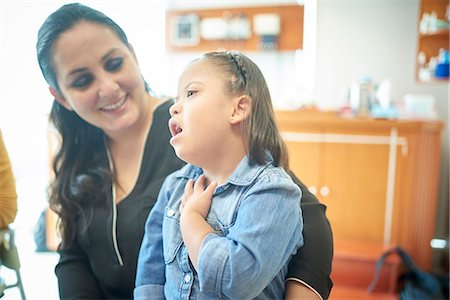Information on relationship and sex education for parents of children on the autism spectrum
This page contains additional information for parents’ of children on the autism spectrum or with related disorders, including why high quality RSE is vital for your child. The information below answers some of the most frequent questions we are asked, however as every child is different please attend your child’s school parents’ session to speak to us in detail.
If we are not in your child’s school please contact us for information on one to one referrals.
Frequently asked questions
If your child has special education needs or a disability please also see the FAQs for SEND parents.
My child isn’t comfortable in social situations, so I don’t think they need this kind of education as they would not be vulnerable. Do they have to have it?
- A report in 2015 by the BBC’s Victoria Derbyshire programme showed that over two years 4,748 reports of sexual abuse against adults with disabilities were reported to 106 of 152 councils in England. The data, secured through a freedom of information request showed that 63% of the 4,748 reported cases were against those with learning disabilities. Research from the US has also indicated that there higher prevalent rates amongst children with autism than those without disabilities. Perpetrators are known to target those that are most vulnerable and unfortunately this often means that children, young people and adults with special educational needs or disabilities are preyed upon.
- Kiranpreet Rehal, Department for Education (DfE) safeguarding project manager at the National Autistics Society details the three of the many reasons why this may be the case.
- They are more dependent on others to meet personal and intimate care needs.
- Not being aware that what is happening to them is even wrong.
- Communication difficulties that prevent the child from expressing concerns about what is happening to them.
- The NSPCC states that 90% of CSE victims know their abuser with many being within the family or a care provider. At BigTalk Education our Growing Up Safe Programme is designed to give children a clear framework of what is right and wrong with the language to tell someone if something happens to them.
- There is an increasing number of threats to children within online environments that we need to protect children from, including ‘sexting’ and cyber bullying which there have been many well publicised incidents occurring with victims on the spectrum.
- The government believes that this type of education is vital, so by September 2019 relationship and sex education will be statutory.
My child doesn’t cope well with change, he/she gets very upset and anxious, how do you deal with that?
- Where possible we deliver within the normal classroom environment to minimise the disruption to the pupils’ routine.
- We are clear from the outset what the lesson includes and what will be the pupils’ required behaviour and input. This is to reduce any possible anxiety.
How do you help my child interpret risky social situations that may happen, I am worried this will be hard for him/her?
- Risky and safe scenarios are shown visually but are elaborated on using ‘social stories’ as recommended by the Autism Society.
- We present information in a literal, ‘concrete’ way, which may improve a person’s understanding of a previously difficult or ambiguous situations or activity.
- By providing information about what might happen in a particular situation, and providing some guidelines for behaviour, we aim to reduce anxiety of these social situation.
I am worried my child will not engage in your lessons, what should I do?
- Participation such as; giving thumbs up or down, completing the physical actions to denote the private areas of the body, or verbal, or written communication are not mandatory for all children in our lessons or workshops.
- If you have concerns over your child’s ability or willingness to participate, please speak with us at the parents meeting (for primary) or speak with school (for primary or senior) and our team can ensure that your child’s requirements are understood prior to the delivery of their sessions.
What will you teach my child about their body and will they understand?
- It is important to clarify that the Growing Up Safe programme goes beyond the NSPCC’s pants rule, as abusers may not only target children in this area. This is why it is particularly important to teach those on the autism spectrum who communicate in a very literal way that other areas are also private.
- To do this we classify the four private areas of the body which we use to teach about good and bad touches, these include the chest and mouth area, in addition to the genital area and the bottom.
I’m worried that my child will take the four private areas quite literally and will not let me touch them at all, even for goodnight kisses?
- The private areas are places where we do not look at our touch other people (or them us) unless we are happy and want them too. We explain so touches are good, for example bedtime kisses.
- We explain to the children that there are exceptions to the four private areas rule.
- These being the children themselves, they must take care of and wash their private areas.
- Doctors, dentists and health care professionals who made need to examine certain areas of the body dependent on the situations. E.g. Listen to their heart using a stethoscope on their chest.
- Also parents may need to assist them, particularly for younger children in things such as toileting or if they have a problem.
My child is displaying sexually inappropriate behaviours such as touching themselves/others, or using inappropriate language, can you help?
- BigTalk Education can deliver one to one or small group sessions with autistic or special needs children either in proactive or reactive referrals.
- We accept referrals from variety of organisations such as schools, children’s centres, social workers, education welfare officers or parents directly.
Introduction to age appropriate RSE
Our guide to high quality, age appropriate relationship and sex education for your child, helping you know what to expect from us.
Parent’s sex education questions answsered
We answer the most frequently asked questions that parents’ ask us about relationship and sex education.
Parents’ of SEND children: FAQs
Information for parents of special educational needs and disabled children, including our mainstream and special school programmes.
Request information on BigTalk Education's services for your school
Introduction to age appropriate RSE
Our guide to high quality, age appropriate Relationship & Sex Education for your child, helping you know what to expect from us.
BigTalk Education's Growing Up Safe Programme
Children want their parents to be the first people to talk to them about growing up, sex and relationships. Yet many parents say they lack confidence to answer their children's questions frankly, Schools are there to help, and BigTalk Education are here to support Schools and Teachers. Members of the BigTalk Team can come into School for a part or whole day, ensuring your children (and you as parents) are well educated to keep them safe, healthy and happy! Find out more >
BigTalk Education's RSE Lessons for Life
Our Programme in Secondary Schools uses a Youth Work approach to RSE delivery, participation, empowerment and inclusion are fundamental to its success. Our Team fosters a non-judgmental, relaxed, receptive atmosphere, which doesn’t shy away from sensitive issues.
Bodies, Babies & Bellybuttons
This book is a gentle introduction for children about their bodies and where they come from. A must have for all parents to help answer your children's questions in a simple, understandable and age appropriate way.








